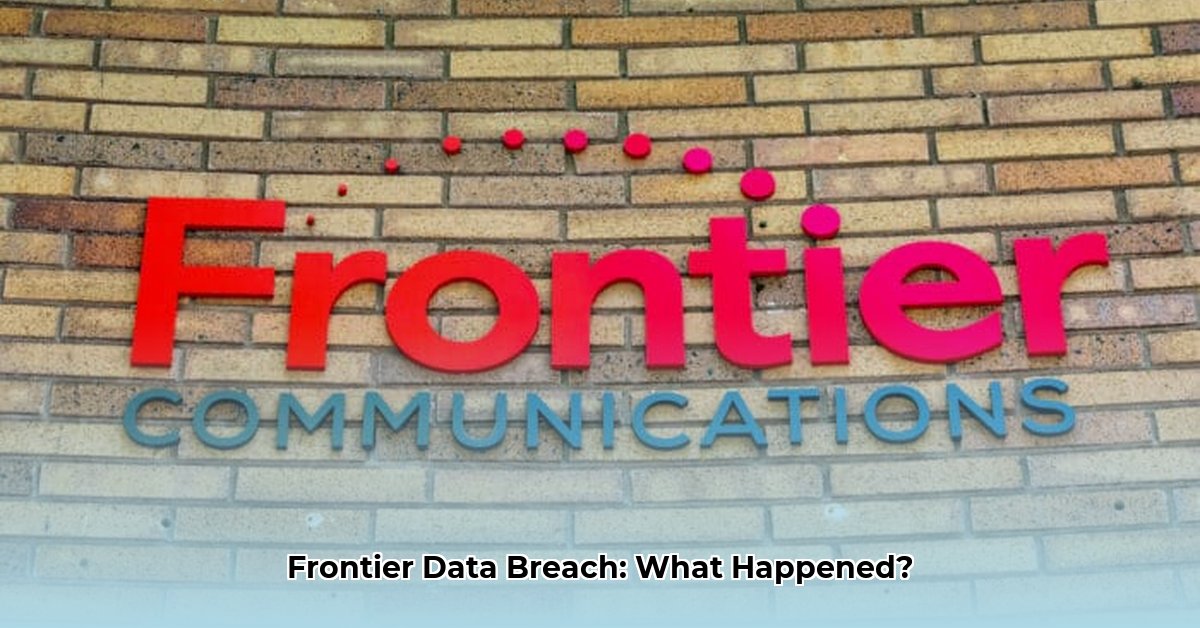
Frontier Communications Data Breach: A Class Action Lawsuit
In April 2024, Frontier Communications experienced a significant data breach, exposing the personal information of over 750,000 customers. This breach led to a class-action lawsuit alleging negligence and inadequate data security measures. The compromised data included sensitive information such as Social Security numbers, addresses, and potentially financial details. This incident highlights the vulnerability of even large companies to sophisticated cyberattacks and underscores the severe consequences for affected individuals.
Background: Frontier Communications and Cybersecurity
Frontier Communications, a major telecommunications provider, offers internet, phone, and television services across the United States. While the company's prior cybersecurity record may not have been publicly marred by major breaches before this incident, the scale of the April 2024 breach raises significant concerns about the company's security practices and their effectiveness. The lawsuit alleges that Frontier failed to implement adequate safeguards against such an attack, ultimately leading to the substantial data loss and subsequent legal action.
Details of the April 2024 Data Breach
The ransomware group, RansomHub, claimed responsibility for the breach. The exact methods used by RansomHub remain under investigation. However, experts suggest potential vulnerabilities within Frontier's systems were exploited. The timeline of events, from initial compromise to discovery and notification, is still being pieced together legally. This lack of transparency has exasperated some customers who remain concerned about the full extent of the data compromise. Frontier's response, while including an offer for credit monitoring services to affected customers, has been met with skepticism given the gravity of the situation and the sensitive nature of the stolen data.
The Class-Action Lawsuit: Allegations and Legal Basis
The class-action lawsuit, Delicato v. Frontier Communications Parent, Inc., alleges negligence on Frontier's part. Plaintiffs claim Frontier failed to implement and maintain reasonable security measures to protect customer data. The legal basis for the action stems from the violation of various data privacy laws and the failure to uphold a reasonable standard of care in safeguarding sensitive customer information. The lawsuit seeks compensation for those affected by the breach, including those who suffered identity theft or financial losses.
Impact on Affected Individuals: Potential Risks and Mitigation
The data breach has significant implications for the affected individuals. The risk of identity theft is substantial, with potential consequences ranging from fraudulent credit card applications to the opening of new accounts in victims' names. Financial losses related to identity theft and credit repair can be significant. The emotional distress of having personal information exposed cannot be overlooked as well.
To mitigate these risks, affected individuals should take the following steps:
- Monitor Credit Reports: Regularly check your credit reports from Equifax, Experian, and TransUnion for any unauthorized activity. (This can be easily done through AnnualCreditReport.com)
- Implement Fraud Alerts: Establish fraud alerts with the major credit bureaus. (Fraud alerts notify you of any new credit applications or inquiries made in your name.)
- Enroll in Identity Theft Protection: Consider using identity theft protection services that offer credit monitoring, fraud alerts, and identity theft resolution services.
- Report Suspicious Activity: Immediately report any suspicious financial activity to your bank and law enforcement.
- Review Insurance Coverage: Check your homeowner’s or renter’s insurance policies to see if they cover identity theft restoration costs.
Frontier's Response: Credit Monitoring and Legal Strategy
Frontier Communications has responded to the breach by offering credit monitoring services to affected customers. However, this response has been met with criticism from some, who argue it is insufficient to compensate for the potential long-term risks of identity theft and the overall security failings. The company's legal strategy will likely center around minimizing liability and potentially challenging the plaintiffs' claims in the class-action lawsuit.
Legal and Regulatory Implications: Potential Penalties and Industry Standards
The Frontier Communications case may lead to significant financial penalties and reputational damage for the company. More broadly, it will likely influence future data security regulations and raise the bar for cybersecurity standards and practices within the telecommunications industry. The outcome of this lawsuit could set a precedent for future cases involving data breaches and corporate negligence. The potential for stricter fines and regulations following this case will likely spur other companies to improve their cybersecurity protocols and practices.
Expert Commentary
"This breach underscores the critical need for proactive security measures," states Dr. Anya Sharma, Cybersecurity Expert at the National Institute of Standards and Technology (NIST). "Companies must invest in robust security infrastructure and employee training to prevent such incidents."
Conclusion: The Ongoing Battle and Future Implications
The Frontier Communications data breach and the ensuing class-action lawsuit are far from resolved. The outcome will have significant implications for the company, its customers, and the telecommunications industry as a whole. The legal battle will determine the extent of Frontier's liability and potentially set a new standard for corporate responsibility in protecting customer data. For affected individuals, proactive steps to monitor their credit reports and protect against identity theft remain crucial. The lasting impact of this breach will serve as a critical case study for the importance of data security and the consequences of negligence in the digital age. The long-term consequences, both legally and reputationally, for Frontier remain uncertain, but the case’s impact on data security practices and legal precedents is certain to be significant.